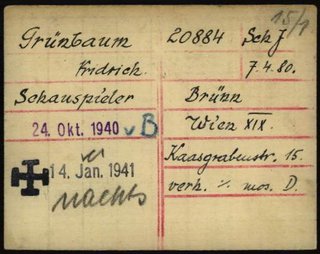Friedrich (Fritz) Grünbaum
Personalia
Born:
Died:
Profession:
Persecution:
Imprisonment March 1938 - 24.05.1938,
Dachau concentration camp 24.05.1938 - 23.09.1938,
Buchenwald concentration camp 23.09.1938 - 24.10.1940,
Dachau concentration camp 24.10.1940 - 14.01.1941,
Murdered on 14.01.1941
KZ Number:
Memberships
Curriculum Vitae
Friedrich Grünbaum, known as "Fritz", was born into a German-Jewish family in Brno as the legitimate son of insurance agent Wilhelm Grünbaum and his wife Regina, née Saxl. His brother Paul was born in 1884 and his sister Elisa in 1885. Wilhelm Grünbaum runs an art and antiques shop in Brno. Fritz Grünbaum, who would later amass an important art collection of classical modernist works himself, was thus confronted with the subject matter at an early age.
After graduating from the German grammar school in his native city, Fritz Grünbaum went to Vienna in 1899 to study law. He was already active as a writer. He graduated in 1903. Afterwards, he initially worked as a journalist, but soon turned to cabaret. In 1906, he appeared for the first time in the cabaret 'Die Hölle', newly opened by Siegmund and Leopold Natzler in the basement of the Theater an der Wien, with funny stories in Brno dialect and was an immediate success. In the same year, he writes the libretto for Leo Fall's operetta 'The Dollar Princess' with Alfred Maria Willner . The royalties from this allowed him to invest in his art collection.
From 1907, Fritz Grünbaum worked as an emcee at the Berlin cabaret "Chat noir". After three years, he returns to Vienna, performs again in the cabaret 'Die Hölle', writes couplets and works on operetta libretti ('Der Zigeunerprimas'). In December 1914, he appeared for the first time in 'Simplizissimus' [Kabarett Simpl].
Fritz Grünbaum served as a one-year volunteer in the First World War on the Italian-Austrian front. He was promoted to first lieutenant and awarded the Silver Medal for Valor. After the failure of his two marriages to the singer Karoline Nagelmüller and the actress Maria Ruth Drexl, he married Elisabeth (Lilly) Herzl, the niece of Theodor Herzl, for the third time in 1919.
On New Year's Eve 1918, he returned to the Viennese public with a performance at the Simpl. From 1922, he appeared here in the famous double bill with Karl Farkas (after the Second World War, Farkas' partner was Ernst Waldbrunn). Fritz Grünbaum also appeared in other Viennese cabaret theaters. In 1923 he became director of the 'Hölle', and together with Karl Farkas he took over the management of the 'Stadttheater' in 1926. In 1927 he opened the 'Boulevard-Theater' with Julius Wiesner in the Annenhof.
Fritz Grünbaum was closely associated with Armin Berg, Hermann Leopoldi and Fritz Löhner-Beda. He is considered one of the most linguistically gifted and versatile representatives of Viennese cabaret of the interwar period - whereby his main and life role is probably that of the impromptu conferencer. From the early 1920s until Adolf Hitler came to power in Germany, he also performed repeatedly in Berlin and Munich. In 1924, he was admitted to the masonic lodge "Schiller" of the Grand Lodge of Vienna [today: Grand Lodge of Austria of Ancient, Free and Accepted Masons].
Fritz Grünbaum soon began working in film, both as a lyricist and screenwriter and as a bit-part actor. Grünbaum wrote operetta libretti and texts for musical comedies for Robert Stolz, Emmerich Kálmán and Ralph Benatzky, among others. He presents a new revue almost every year. He also created an extensive oeuvre as a pop lyricist. His best-known lyrics include 'I hab das Fräuln Helen baden sehn' and 'Du sollst der Kaiser meiner Seele sein'.
On March 10, 1938, the day before the German troops march into Austria, he plays with Karl Farkas one last time at the 'Simpl'. Afterwards, the Reich Chamber of Culture bans Jewish artists from performing. One day later, Fritz Grünbaum tried to flee to Czechoslovakia with his wife on the night of March 11 to March 12, 1938, but was turned back at the border. He hid in Vienna for a while, but was betrayed, arrested [note: the exact date of arrest is unknown] and deported to Dachau concentration camp on May 24, 1938. On September 23, 1938, he was transferred to the Buchenwald concentration camp

However, he has a sharp tongue to the end. For example, he talks about how he intends to defeat the 'millennial empire' or that total deprivation and systematic starvation is the best cure for diabetes.
If you don't have money for soap, don't keep a concentration camp.
Places
Residence:
Persecution:
Death Place:
Honoring:
Citations
Wikipedia unter de.wikipedia.org/wiki/Fritz_Grünbaum
Wiener Stadt- und Landesarchiv (WStLA)
Wien Geschichte Wiki unter www.geschichtewiki.wien.gv.at/Fritz_Grünbaum#tab=null
Großloge von Österreich unter www.freimaurerei.at
